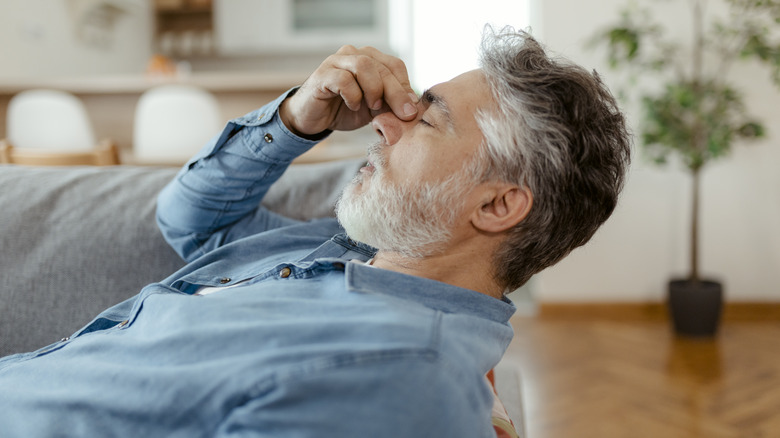
If This Happens To Your Head, You Might Be Dehydrated – Health Digest
A dry mouth, reduced urine output, and feeling thirsty may be more obvious signs of mild dehydration. However, what’s going on inside our heads can also give us a clue as to whether our bodies may be low on fluids and electrolytes.
When we lack fluids, experts explain that this can prompt the brain to temporarily shrink. A headache may then occur as the brain contracts away from the skull. Having a headache behind your eyes, known as a dehydration headache, can be a sign of mild, moderate, or severe stages of dehydration, explains Medical News Today. For some people, a dehydration headache may also take the form of a dull ache or a severe migraine that can affect any and all areas of the head.
Headache behind the eyes as a dehydration symptom
Infants, children, older adults, athletes, and people with certain chronic health conditions, such as diabetes, tend to be more prone to dehydration (via Medical News Today), but anyone may experience a dehydration headache, Healthline explains. They add that people with preexisting headache conditions are at greater risk, and may find that not drinking enough water can induce a tension headache or migraine. While each of these headache conditions comes with its own unique symptoms, in cases of dehydration headaches specifically, pain is not usually felt in the neck or face but rather behind the eyes.
Such was the case for public speaker Lynn Julian, who told GoodRx Health that she first began experiencing migraines during adolescence. While her symptoms had since improved, Julian told the source that she is now occasionally prone to dehydration headaches after having sustained a traumatic brain injury (TBI) during the Boston Marathon bombing in 2013. However, she doesn’t liken the headaches to migraines. “[It] feels like a pressure headache that is sort of squeezing, and it’s all across the front of your head,” she stated. While some types of migraines come with aura, this is not the case for dehydration headaches.
Rehydration is key in treating dehydration headaches
While more research is needed on dehydration headaches, rehydration should be your first line of defense in treating symptoms. Findings of an early 2005 study published in Neurology found that brain volume temporarily decreased following 16 hours of restricted fluid intake, but that rehydration reversed these effects.
Most people begin feeling better within three hours of replenishing the body with fluids, which can be achieved by slowly drinking a couple of glasses of water (via Healthline). Bear in mind that drinking too much too fast can potentially have adverse effects.
If you’re in need of a little extra hydration, add in an electrolyte drink after you’ve drank plenty of water to help restore the body’s balance of essential minerals. Julian told GoodRx Health that she also turns to superfood sources to keep hydrated, stating, “Eat foods that keep water in you, like fruits and vegetables, and not too many things that suck it out of you, like sugar.”
In cases of severe dehydration, go to the nearest emergency room. Signs that your hydration levels have dropped too low include rapid breathing, sunken eyes, low blood pressure, dark urine, and a fast heart rate. Individuals who are particularly vulnerable to dehydration who exhibit mild symptoms should also seek medical care.





